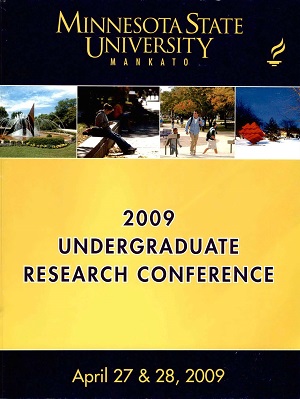Completing the Triangle: Alcohol Attitudes and Risk-Taking Behavior
Location
CSU Ballroom
Start Date
27-4-2009 1:00 PM
End Date
27-4-2009 3:00 PM
Student's Major
Psychology
Student's College
Social and Behavioral Sciences
Mentor's Name
Dawn Albertson
Mentor's Department
Psychology
Mentor's College
Social and Behavioral Sciences
Description
According to a recent study, over five million college students binge drink at least once every month. A thorough understanding of the factors involved with alcohol use is crucial when trying to successfully reduce risky drinking behaviors in students. Although studies have demonstrated relationships between alcohol attitudes and drinking behavior, as well as risk taking and drinking behavior, this was the first study directly assessing the relationship between risk taking behavior and alcohol attitudes. Two hundred and forty participants from a medium-sized Midwestern university were used in this study. First, participants completed the Balloon Analogue Risk Task (BART), a computer-based assessment that measures an individual's willingness to take risks based on rewards. Next, participants were asked to complete a questionnaire that assessed their thoughts, attitudes, and beliefs toward alcohol before taking the BART once again. We expect risk-taking behavior, as assessed by the BART, to be significantly correlated with more positive attitudes, thoughts, and feelings toward alcohol. If so, a complete triangle would be formed that links alcohol use, risk taking, and alcohol attitudes together. This triangle of knowledge would help to gain a more complete understanding of the factors that influence alcohol consumption and could be used to prevent dangerous drinking behaviors in college students.
Completing the Triangle: Alcohol Attitudes and Risk-Taking Behavior
CSU Ballroom
According to a recent study, over five million college students binge drink at least once every month. A thorough understanding of the factors involved with alcohol use is crucial when trying to successfully reduce risky drinking behaviors in students. Although studies have demonstrated relationships between alcohol attitudes and drinking behavior, as well as risk taking and drinking behavior, this was the first study directly assessing the relationship between risk taking behavior and alcohol attitudes. Two hundred and forty participants from a medium-sized Midwestern university were used in this study. First, participants completed the Balloon Analogue Risk Task (BART), a computer-based assessment that measures an individual's willingness to take risks based on rewards. Next, participants were asked to complete a questionnaire that assessed their thoughts, attitudes, and beliefs toward alcohol before taking the BART once again. We expect risk-taking behavior, as assessed by the BART, to be significantly correlated with more positive attitudes, thoughts, and feelings toward alcohol. If so, a complete triangle would be formed that links alcohol use, risk taking, and alcohol attitudes together. This triangle of knowledge would help to gain a more complete understanding of the factors that influence alcohol consumption and could be used to prevent dangerous drinking behaviors in college students.
Recommended Citation
Murphy, Christina and Danielle Polzin. "Completing the Triangle: Alcohol Attitudes and Risk-Taking Behavior." Undergraduate Research Symposium, Mankato, MN, April 27, 2009.
https://cornerstone.lib.mnsu.edu/urs/2009/poster-session-B/14




